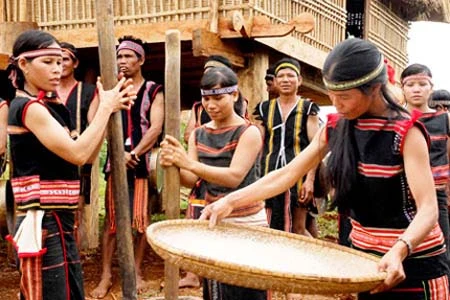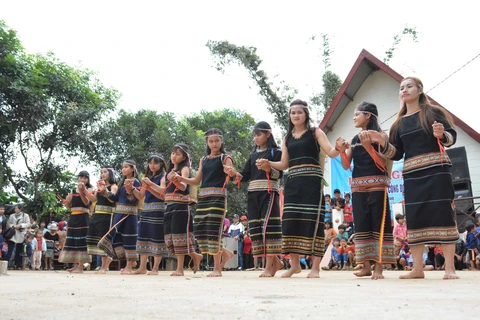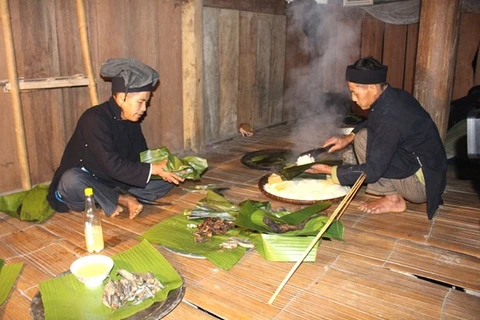 A tray of offerings in the new rice festival of Xinh Mun ethnic minority people in Dien Bien province (Source: The Vietnam National Institute of Culture and Arts Studies)
A tray of offerings in the new rice festival of Xinh Mun ethnic minority people in Dien Bien province (Source: The Vietnam National Institute of Culture and Arts Studies) Hanoi (VNA) - The new rice festival in the northern mountainous province of Dien Bien is an occasion for people to offer their ancestors traditional dishes, invite them to taste rice from freshly harvested crops, and pray for good health and bumper harvests.
The Xinh Mun ethnic minority group resides in Dien Bien Dong district’s Chieng So commune. Upland farming is their way of life, and it is believed that yields are determined by the spirit of rice as well as the gods of arable upland and of water. Therefore, they often conduct agricultural rituals, praying to supernatural forces for good health and bumper crops. Among them, the new rice festival (Tra pa me in local language) is the most important.
The festival reflects the community’s gratitude toward those giving birth to and raising children, and imparting working knowledge and experience, especially in seasonal farming techniques.
It is an occasion for people to offer their ancestors traditional dishes, invite them to taste rice from freshly harvested crops, and pray for good health and bumper harvests. The celebration helps preserve the group's traditional culinary delights and demonstrates the folk knowledge of Xinh Mun's cuisine in exploiting natural food for daily life.
At the meaningful event, members of Xinh Mun families and clans gather together to celebrate the fruits of their labour after a hard crop year. Grandparents and parents take this occasion to teach their children to appreciate labour and the tradition of ancestor worship, hence the formation of a more close-knit family clan.
The ethnic group considers the new rice festival their traditional New Year festival, as it marks the end of past activities and the beginning of a new cycle of life. The venue is set at the ancestral worshiping space in a local house. Xinh Mun people put a small rectangular screen tied to a 1.5m-2m long bamboo stick in the middle of the space. To them, this is where their ancestors reside.
Before the festival, the owner of the house brings gifts to a shaman or a reputable person in the village to ask for a nice day to perform the ceremony. Family members, meanwhile, prepare offerings that include new rice, bamboo shoot worms, fish, fruits, vegetables, and meat.
The head of the family will directly clean the ancestral altar, assigning family members to clean the house, prepare offerings, and decide to invite people to join the celebration. In the past, only relatives were invited. Now guests of the family can also come.
On the day of the ceremony, the head of the family or the women in the house go to the most beautiful and productive paddy fields to pick the first rice of the harvest as an act of welcoming the spirit of the rice to attend the ceremony.
The head of the family is also the one who performs the following rituals at home, which include cleaning the worshipping space, tying the new rice on the screen, praying, and presenting a tray of offerings. Xinh Mun people don’t offer incense, they only pray to invite their ancestors.
Once the worshiping ceremony completes, the offering tray is brought out to serve the head and reputable family members.
After the ceremony, the family and guests gather around trays of rice and food, drink alcohol, and greet each other.
The end of the festival is also the end of an old year and a productive labour cycle. It opens a new year and a new season with many new wishes of Xinh Mun ethnics for a favorable new crop year and good luck.
Based on its unique cultural value, the group’s new rice festival was accredited as a national intangible heritage in Vietnam in January of 2022./.























